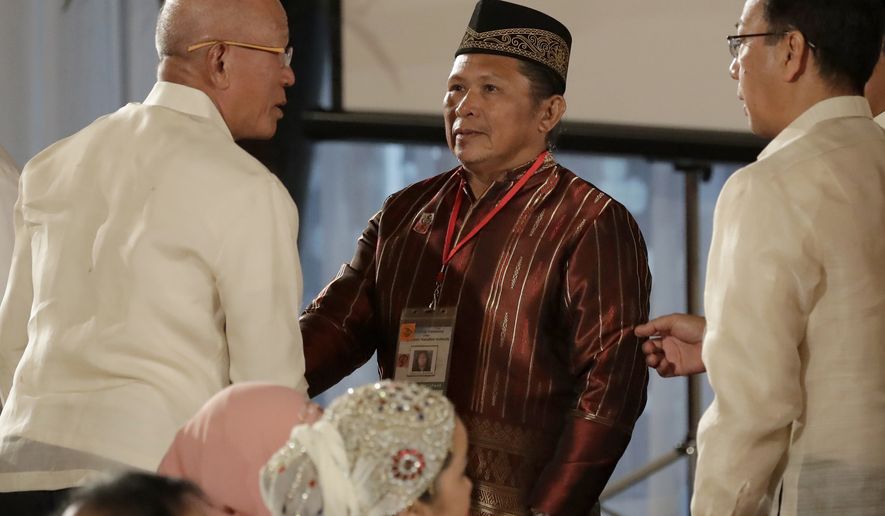The top Philippine defense official called Tuesday for a review of his nation’s decades-old military treaty with Washington, saying Manila fears being sucked into a “war that we do not seek and do not want” should the U.S. and China suddenly clash over the region’s disputed waterways.
“The United States, with the increased and frequent passage of its naval vessels in the West Philippine Sea, is more likely [than the Philippines] to be involved in a shooting war,” said Defense Secretary Delfin Lorenzana, using the Philippine name for the South China Sea. “In such a case and on the basis of the Mutual Defense Treaty, the Philippines will be automatically involved,” he said in a statement, days after Secretary of State Mike Pompeo sought ease such concerns during a visit to Manila.
There was no immediate comment from the Pentagon on Tuesday. But the back-and-forth over the 1951 Mutual Defense Treaty comes amid sensitivity in U.S. military relations with several East Asian nations, who find themselves increasingly courted and challenged by China, which appears bent on expanding its regional military footprint.
China’s navy is seen to be seeking unprecedented docking and refueling accesses in locales otherwise aligned with the U.S., and, in the Philippines, Chinese companies recently made inquiries to take over the main shipyard at Subic Bay that once housed one of the U.S. Navy’s biggest and most strategic bases.
Such moves, coupled with Beijing’s construction of island bases in the South China Sea, loomed behind Mr. Pompeo’s Manila visit Thursday and Friday. Trump administration officials “are worried that the Chinese are using their power in ways that will deny freedom of navigation to every country in Asia, the Philippines included,” the secretary of state said.
During a press conference with Philippine Foreign Secretary Teodoro Locsin, Mr. Pompeo said U.S. forces are at the ready to respond if China becomes too aggressive. “Any armed attack on Philippine forces, aircraft or public vessels in the South China Sea would trigger mutual defense obligations under Article 4 of our Mutual Defense Treaty,” he said. “Our commitments under the treaty are clear, and our obligations are real.”
For his own part, Mr. Locsin pushed back against the notion that Manila seeks a review of the treaty. “I believe in the old theory [that] in vagueness lies the best deterrence,” the Philippine foreign secretary said. “I don’t believe that going down into the details is the way the sincerity of the American commitment will be shown.”
“They will respond, depending on the circumstances,” he added. “But we are very assured.”
However, Mr. Lorenzana, the Philippine defense minister, presented a different argument on Tuesday. “It is not the lack of reassurance that worries me. It is being involved in a war that we do not seek and do not want,” he said in his statement.
Mr. Lorenzana said the treaty should be re-examined to clear up ambiguities that could cause chaos and confusion during a crisis. He added that the Philippines does not seek to engage any country in a war over contested territories in the region’s waterways.
Long-seething South China Sea territorial disputes are a key irritant between Washington and Beijing, which has, over recent years, turned several barren reefs into islands with runways and other military facilities. The U.S. has declared that the peaceful resolution of the disputes and freedom of navigation in the contested areas are in the U.S. national interest.
In addition to China, the Philippines, Vietnam, Malaysia, Taiwan and Brunei have overlapping claims in the strategic waters. U.S. Navy ships have recently sailed close to Chinese-occupied islands to assert freedom of navigation, provoking angry protests from China and tense moments between the rival naval forces.
In Manila on Tuesday, a government spokesman said the Philippine defense department was checking a report that Chinese vessels have been blocking Filipino fishermen from approaching sandbars near Philippine-occupied Thitu Island, which is called Pag-asa by Filipinos. Philippine officials have separately said China has deployed surveillance ships and fishing flotillas off three newly emerged sandbars called Sandy Cay near Thitu since 2017 to prevent the Philippines from occupying them.
Mr. Lorenzana said the U.S.-Philippine treaty would have been reviewed as far back as 1992, when huge American bases were closed in the country. A few years after U.S. forces left, he said, the Chinese began aggressive actions in an area known as Mischief Reef. “The U.S. did not stop it,” Mr. Lorenzana said, referring to a Philippine-claimed reef, which China seized around 1995 in the Spratlys Islands, the most hotly contested territories in the busy South China Sea.
• This article is based in part on wire service reports.
• Guy Taylor can be reached at gtaylor@washingtontimes.com.




Please read our comment policy before commenting.